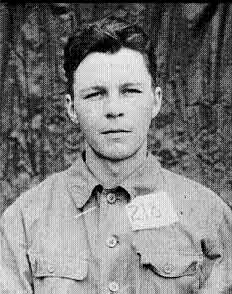|
Pvt Norman Johnny Skubinna Died 12 April 1945 at Mitsushima |
Mitsushima Roster Mitsushima Main
|
Source: Martin Skubinna, PhD; cousin of Norman Skubinna  Norman
(Johnny) Skubinna joined the U.S. Army on February 8, 1942 to
fight in World War Two. After his basic training, he was sent
to the Philippines. He served with the Second Battalion of the
60th Coast Artillery. Norman fought on Corregidor. When Corregidor
fell on May 6, 1942, he was taken prisoner by the Japanese. The
Japanese kept him in the Philippines until March 7, 1944. He
was then transferred to Japan where he remained until his death
on April 12, 1945. Norman
(Johnny) Skubinna joined the U.S. Army on February 8, 1942 to
fight in World War Two. After his basic training, he was sent
to the Philippines. He served with the Second Battalion of the
60th Coast Artillery. Norman fought on Corregidor. When Corregidor
fell on May 6, 1942, he was taken prisoner by the Japanese. The
Japanese kept him in the Philippines until March 7, 1944. He
was then transferred to Japan where he remained until his death
on April 12, 1945.The following story relates the "Details of Life in Jap Prison Given by Friend of Norman Skubinna" and is printed in full: "After the fall of Corregidor, Norman J. Skubinna was stationed in Philippine Military Prison Camp No. 10-A. From this time on, the Japanese Government was drafting these prisoners in work units of two to three-hundred in a group. Norman missed the draft until March 7, 1944, when he was ordered to stand by to be shipped to Japan in a work unit of three-hundred American boys. These boys were loaded abroad [sic] an old 60,000-ton freighter [Taikoku Maru] and marched down in the hold in which they made this voyage. They had a steel floor without any beds and steel walls. This trip was eventful. It stormed, was foggy, wet and cold. They rigged up an old 55 1/2 gallon gas barrel on deck over which they warmed themselves and cooked the little food that was given to them. On this trip, the boys most all were sick and in bad condition. They landed in Osaka, Japan [on] April 9, 1944. Due to the terrible weather enroute, they were spared being bombed or torpedoed. When they arrived in Osaka, they enjoyed warm rooms and warm food. The Japs had some Korean girls to cook the rice for the boys. They were even given the most luscious treat of a few carrots and fish added to their skimpy ration of rice. "They rested in this manner for a couple of weeks [Osaka Branch Camp #1 Kawasaki] then they were transferred to Hitatche [sic] where they were forced to work in a copper mine [Tokyo Branch Camp #8 Hitachi (Motoyama)]. This mine was located in the mountains. The camp site was located a mile above the mine shaft, the terrain being so steep they had to carry or pull up their supplies. The path on which they went to and from work was so steep it would zig-zag up the mountain . . . . This mine was an old shaft straight down and in a very bad condition with water standing all over the mine floor. The boys were not permitted to wear their shoes as they were furnished with a sort of tennis shoe so their feet were wet continually. They went down in this mine with a lamp attached to their caps like a miner's lamp and they dug out this copper ore with picks in the slosh and loaded it in little cars. They were served two meals of rice each day and those that got sick had their rations cut as they were told they did not earn full rations. "In September 1944, the Japs decided they could not dare risk having this many American boys in one group in case of invasion, for fear the boys would make a break for freedom, so they split up . . . into groups of three-hundred. Norman was transferred in a group of eighty boys inland on a dam project at Mitsushima [became Tokyo 12-B at end of war] where he worked until he had an accident. The report stated that a beam or something similar fell on his head causing a skull fracture which formed a blood clot which needed immediate operation. [Gordon noted that he slipped on an icy platform and hit his head on the cement] Up until then he was getting along very nicely under the circumstances. His buddies and what medical authority they had in camp, pleaded again and again with the Japanese officials to give them tools with which to operate or sent him to Tokyo General Hospital where they could x-ray and operate, but the Japs ignored their pleas and they promised that tomorrow they would do something. They kept this up until the boys got desperate and they started to make some crude tools in the shop with which to operate, but it was too late as by this time, the clot had ruptured and the end was sudden. "Norman's buddy, when asked the feeling of the boys toward the end of the war stated, "There was never any doubt in our minds, if we could only sweat it out long enough, we would be freed."
A funeral service was held for Norman on November 11, 1945
at the St. Andrew's Lutheran Church, Mahtomodi, Minnesota."
His body was cremated and the urn buried at the National Cemetery
at Fort Snelling, St. Paul, Minnesota.  Lest
We Forget Lest
We Forget |